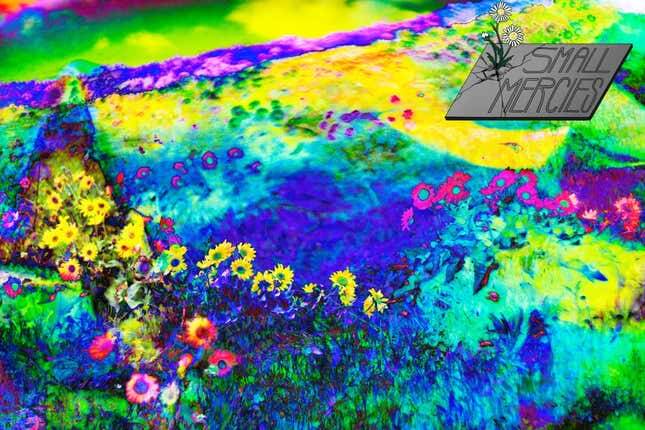Small Mercies: Magic Mushrooms Helped Me Regain Control of My Brain
Could psilocybin actually change my mind, or is it all in my head?
In DepthIn Depth
Image: jhillphotography
In the influential 2019 book about psychedelics, How to Change Your Mind, Michael Pollan describes a conversation he had with famed psychonaut Paul Stamets regarding Stamets’s idea that psilocybin, the compound that makes “magic mushrooms” magic, is a “chemical messenger sent from Earth, and how we had been elected, by virtue of the gift of consciousness and language, to hear its call and act before it’s too late.” According to Stamets:
“Plants and mushrooms have intelligence, and they want us to take care of the environment, and so they communicate that to us in a way we can understand.” Why us? “We humans are the most populous bipedal organisms walking around, so some plants and fungi are especially interested in enlisting our support. I think they have a consciousness and are constantly trying to direct our evolution by speaking out to us biochemically. We just need to be better listeners.”
Mycophilosophers have floated the notion that the drug is a direct transmission from nature because it doesn’t make much evolutionary sense that psilocybin should have the effect on consciousness that it does. We simply don’t know why it does what it does, so for the time being, here’s a why as good as any, and it’s a fun why. It could explain why this essay exists—the mushrooms made me write it. Stamets’s idea brings a unique depth to the phrase “under the influence.”
It might sound outlandish, but Stamets is hardly alone in his thinking. The ethnobotanist Terence McKenna, a major influence of the psychedelic movement in the ‘80s and ‘90s, also spoke of fungal will. In 2020’s Entangled Life: How Fungi Make Our Worlds, Change Our Minds & Shape Our Futures, Merlin Sheldrake explains that, “McKenna thought fungi could wear our minds, occupy our senses, and, most important, impart knowledge about the world out there.” That connectedness that people describe after a psilocybin trip—to each other and nature—would come as no coincidence, according to this theory. “Fungi could use psilocybin to influence humans in an attempt to deflect our destructive habits as a species,” writes Sheldrake on McKenna’s behalf.
If in this space I’m just a medium, a pawn in the mushrooms’ grand scheme, well, let me assure you that I’m happy to be of service. I’m putting this upfront not only so that you understand my potentially mushroom-directed bias, but also to establish my tone. It’s only going to get more woo woo from here, so tune in and/or drop out. I was telling some guy about this theory at a party recently and his patient but terse response was, “Oh. Out there!” Yeah man, far out.
Do I actually believe that nature is communicating directly with us through psilocybin? I am as agnostic about this as I am any forces beyond our immediate understanding as a species. But since I started integrating psilocybin as therapy in 2020, a practice that only grew in 2021, the idea is now firmly swirling in my pot of possibilities.
My experiences with this drug have been profound and, I believe, have changed my outlook on life and the way I process certain things for the better. In most of the mycological texts cited in this essay, you see one statistic come up again and again: More than 70 percent of participants in a Johns Hopkins study titled “Psilocybin can occasion mystical-type experiences having substantial and sustained personal meaning and spiritual significance,” said their single encounter with psilocybin for the study was in the top five most spiritually significant experiences of their lives (of that group, 33 percent said it was the most spiritually significant experience).
I can relate. Last year, I underwent a guided trip with a shaman I found online named Crow. It was in the thick of lockdown, so we did this via Zoom (he’d never guided anyone via Zoom but was willing to try). The session went like this: We’d chat for a bit, and then I’d put on my Mindfold, a blackout mask that allows the same absence of light whether one’s eyes are opened or closed, and he’d drum or rattle while I looked around my mind, and then we’d talk about what I saw or thought about. In six hours, we completed maybe four of these cycles: I went under, as it were, and then we convened for informal therapy. Crow talked a lot about the spirit world that the psilocybin allowed me to access.
Should mushrooms provoke unpleasantness, you’re supposed to steer into it, not away from it
No matter how much you want to invest in that line of thinking, though (and I did invest in it, if for no other reason than when I’m tripping I am highly suggestible) this was someone who had taken a lot of psychedelics in his life and knew how to trip. His knowledge base was as practical as it was theoretical. He kept ushering me along—after I came back from poking around my brain and reported the incredible imagery I saw (beautiful scarabs, fractals on a snake that was coiled in a triangle formation, H.R. Giger’s original alien suspended in air, some kind of ceremonial coronation of a creature that looked like the brain bug from Starship Troopers that took place on a barge), he told me that I could keep floating around seeing the sights or I could actually do some work.
-

-

-

-

-

-

-

-

-

-

-

-

-

-

-

-

-

-

-

-

-

-

-

-

-

-

-

-

-

-

-

-

-

-

-

-

-

-

-

-








































